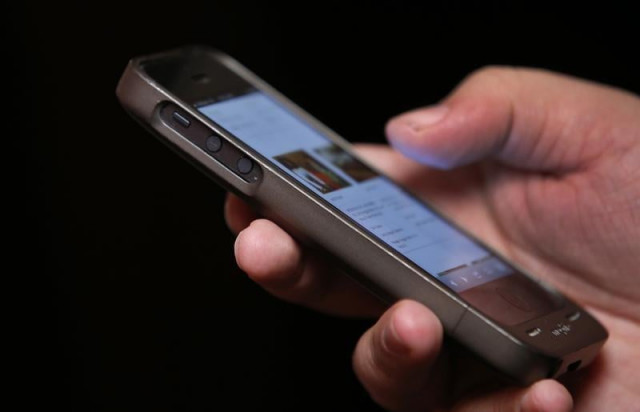Major progress likely in telecom sector ahead of 5G
3G/ 4G subscribers crossed 60 million mark in 2018, rising 26.58%

A man uses a smartphone. PHOTO: REUTERS
However, the second half of the year was more phenomenal compared to the first. The year kicked off with Oman Telecommunication Company (Omantel) exiting WorldCall Telecom (WTL) after injecting $20 million and thereby wiping out all its liabilities.
In 2008, Omantel had acquired 56.8% stake in WTL, which started incurring losses shortly afterwards. That forced Omantel to settle its liabilities and pull out once and for all. Moreover, the Pakistan Telecommunication Authority (PTA) launched the Device Identification, Registration and Blocking System (DIRBS), designed to block smuggled and stolen mobile handsets in the country.
The drive was aimed at assisting the government in curbing tax evasion as well as mobile theft. The system enabled users to pair their devices with the Computerised National Identity Card (CNIC), which then becomes the phone’s identity.
Through the system, the PTA aims to maintain a database of all mobile phones in the country. During the year under review, mobile phone subscriptions surged past the 150-million mark, rising 5.86% to 153 million compared to 144.52 million in December 2017.
Similarly, the 3G/4G subscribers also crossed the 60-million threshold and rose by a hefty 26.58% to 61 million compared to 48.19 million in Dec 2017.
On a similar note, the size of Pakistan’s e-commerce market skyrocketed 93.7%. As reported by the State Bank of Pakistan, sales of local and international e-commerce merchants touched Rs40.1 billion in FY18 compared with Rs20.7 billion in FY17. The year added a massive value to the country’s thriving ecommerce industry.
Near the end of the year, Telenor launched 4.5G technology in major cities of Pakistan. On the other hand, Jazz shared plans to invest over $200 million for the expansion of 4G services in remote areas of Pakistan in 2019.
Adding to the online payment system, China’s Alipay, one of the largest global online payment platforms, announced the beginning of operations in Pakistan after its parent company Ant Financial acquired 45% stake in Telenor Microfinance Bank.
On the legal front, the Supreme Court of Pakistan suspended the taxes charged by telecom companies on prepaid mobile phone cards, terming it illegal.
In addition to that, in a major policy shift, Minister of State for Revenue Hammad Azhar tweeted that the passengers travelling to Pakistan would be allowed to bring in only one mobile phone per year free of customs duty as per personal baggage rules.
The move is meant to aid government’s revenue.
While a maximum of five smartphones can be brought under the new regulations in a year, the customs duty will be applicable on the extra four handsets. The same duty is also imposed on used cellphones.
Way forward
Multiple reports of the PTA stated that 5G technology would be tested in Pakistan in 2020. Hence, the country can expect significant developments on this front in 2019.
Moreover, major network providers in Pakistan are expected to follow Telenor and introduce 4.5G to enhance their services. The country's e-commerce industry may widen even further on the back of a booming freelancing sector.
However, the customs duty levied on new and used mobile phones may prove to be a hurdle in the way of an otherwise growing industry.



















COMMENTS
Comments are moderated and generally will be posted if they are on-topic and not abusive.
For more information, please see our Comments FAQ